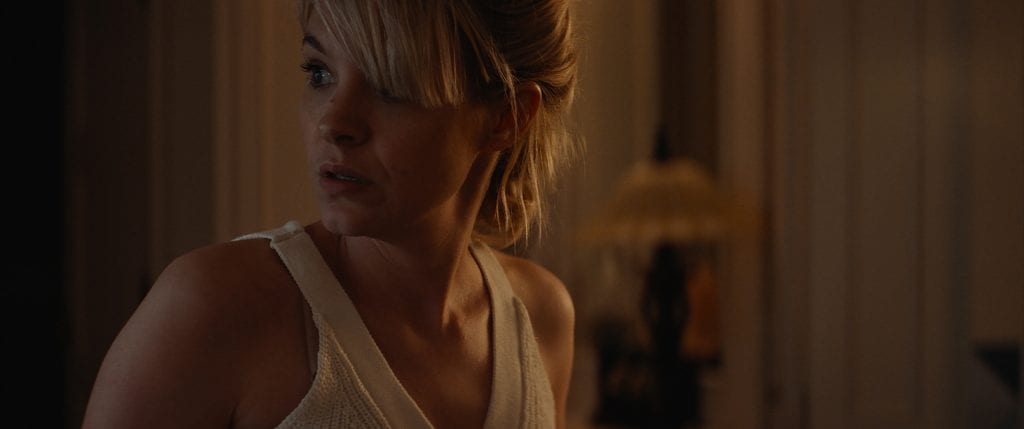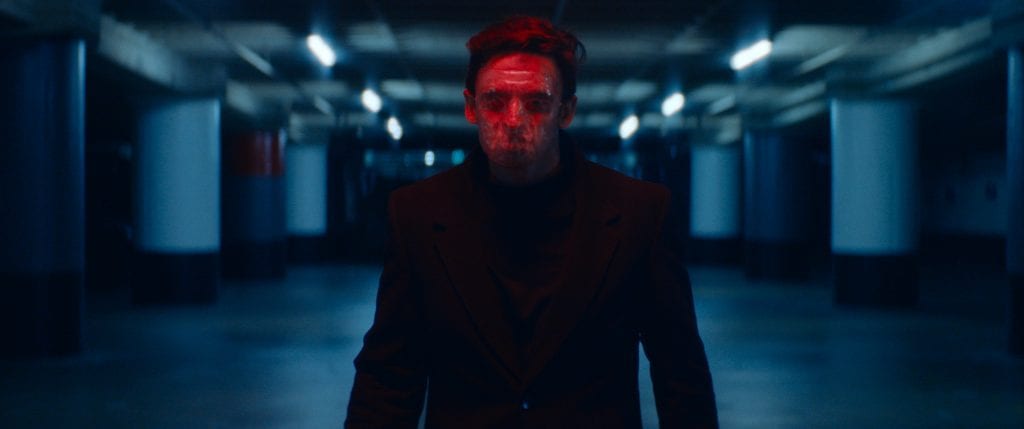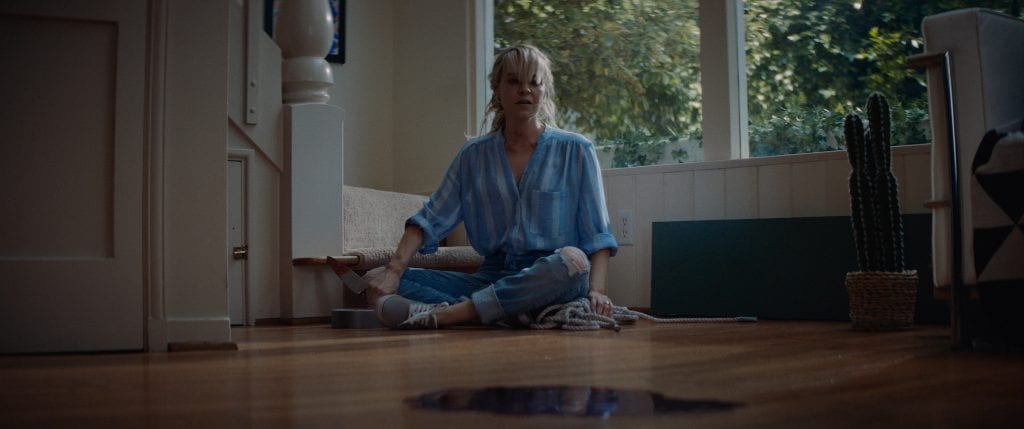

Lucky is a dark, bloody, and pointed satire about a woman perpetually attacked by a masked stranger night after night, and how nobody really seems to care.
Shudder’s latest exclusive, Lucky follows a woman named May (Brea Grant), a self-help author who writes about how relying on yourself more than others – her latest book is literally titled “Go It Alone” – is the best way to live a satisfying life. May has certainly attained a level of success for herself; she spends peaceful days in her sizable home with her tall and handsome husband Ted (Dhruv Uday Singh) and seems to have things pretty well figured out.
One night, May awakens in the middle of the night to find a silent masked man (Hunter C. Smith) standing in her backyard. Obviously fearful, she wakes Ted to tell him what’s going on, but her husband only drowsily responds to her panic with: “Honey, that’s the man. The man who tries to kill us every night.”
As the man forces his way through the house, breaking windows and doors, Ted, stone-faced to the point of boredom, peruses the bedroom for a weapon to defend himself with. May is as aghast as she is flabbergasted. “What the hell is going on?” They successfully fight the masked stranger off, but he quickly disappears, which Ted shows very little concern over and insists the two of them simply head back to bed.

The police are equally as unconcerned the next day, which May is rightfully frustrated with, and Ted’s refusal to further explain what it is they just went through only adds to her confusion. Exasperated with her after the slightest bit of questions and worry, Ted leaves, telling May that maybe he’ll come back once she’s done being hysterical. The man returns that evening, and every evening after that, forcing May to continuously fight for her life night after night. Alone.
Lucky blends elements of home invasion and psychological thrillers, slashers, and time loop movies to create a rather poignant and darkly humorous satire, one whose social commentary is obvious but never heavy-handed. The film calls to mind Steven Soderbergh’s Unsane or Leigh Whanell’s The Invisible Man in the ways May is continuously gaslit and dismissed by authority figures, friends, and her partner to the point that she questions herself and her own sanity. While she initially learns how to better defend herself and deal with the murderous man more easily, the fact that her nightly battles are seemingly never going to end start to take its toll. Dark circles form under May’s eyes, she becomes far more paranoid, and both her personal and work life begin to crumble as she struggles to keep it together.
Brea Grant – who wrote the film as well as stars in it – has always played with genre in her work as an actress, writer, director, producer, podcaster, comic book writer, and graphic novelist to the point where her projects are difficult to narrow down to specific categorization. Her previous films, apocalyptic road trip flick Best Friends Forever and the darkly comedic heist film 12 Hour Shift, certainly contain moments of genuine horror and suspense, but they lean more towards levity and fun. Had Grant directed this latest project, it may have contained the feel of something like Happy Death Day, which has a similar scenario of a woman stuck in a time loop where she’s repeatedly under attack from a masked stalker; a grim concept that’s executed with more humor than any kind of gloominess.

But unlike time loop movies, the true horror of Lucky’s repeating setup is the fact that time doesn’t reset. May has to do the same song and dance with the man every single night, but it’s not something that’s erased from either her mind or the minds of others after each experience. Instead, the occurrence becomes commonplace, normalized and even sometimes rationalized by everyone in May’s life, before eventually she’s worn down into normalizing it herself. Directing duties have been passed to Natasha Kermani (Imitation Girl), who presents the story and its message with a seriousness that gives proper weight to the subject matter and sufficient menace to its villain. The film’s humor comes from the deadpan performances of the supporting cast, perfectly capturing the absurdities of how easily people are willing to accept the rules of a world that’s seemingly gone mad, and dismiss the fears of anyone who isn’t keen to play along.
At its core, Lucky is an assessment of violence against women and the experiences of women in general in a misogynistic society; how every woman faces the same struggle, and how they’re often divided and left to fend for themselves as the constant fight for survival wears them down. The way that this is represented by a literal, physically violent man stalking and attacking a woman, coming at her consistently and methodically as the world around her shrugs its shoulders, is hardly an exaggeration.

Presented in an insightful and entertaining way, it’s already a sharp piece of art on its own, but in a post-2020 world, the film resonates in even more ways. It hardly matters who the man really is – he could be read as a manifestation of that unstoppable force in life that constantly appears to knock us down. No matter how many times we triumph over him, he gets right back up. In today’s world, it can feel like traumatizing event after traumatizing event continues to happen on a daily basis, and everyone merely accepts this, normalizes it, and moves on. Advice for how to handle these things only comes in the form of empty platitudes and condolences. Many survivors of violence (in any form) are often told how lucky they are to still be standing, but as May – thrown into a world she no longer recognizes, perpetually covered in blood, and burdened by a growing, depressing sense of resignation – shows us, that’s hardly the case.
Lucky is streaming on Shudder starting March 4th.
Latest on KNOTFEST.com